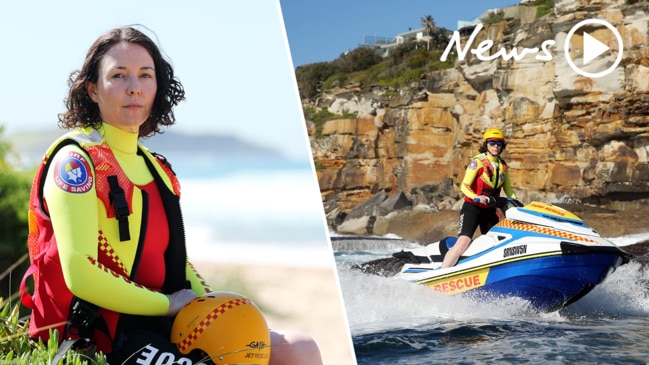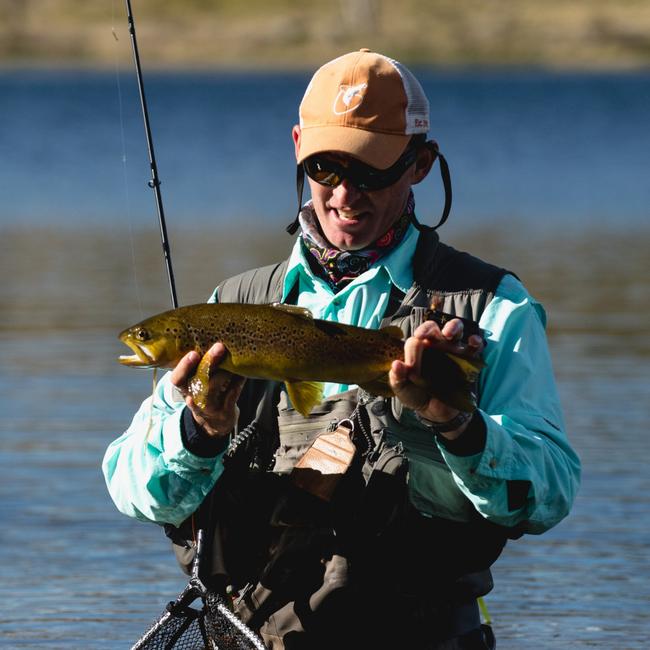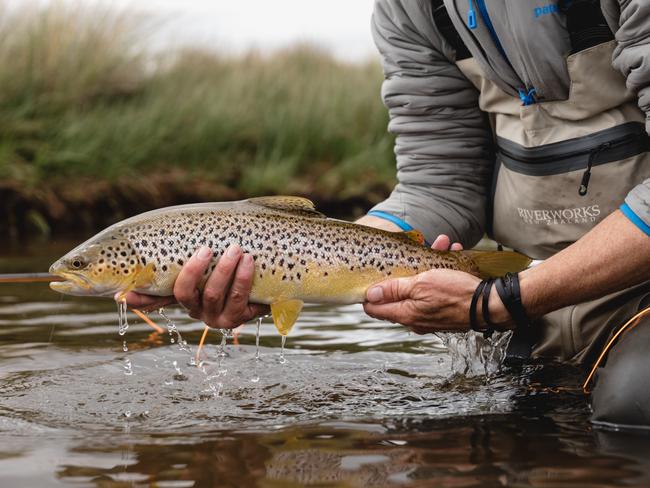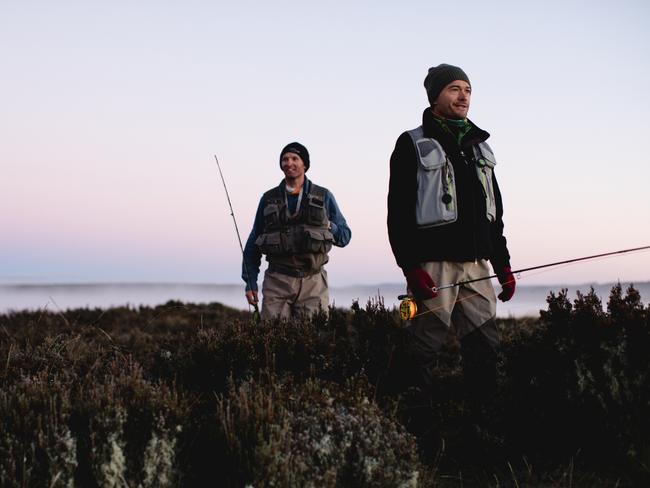TasWeekend: World’s best anglers are out to chase our prized catch
Tasmania’s lakes and rivers continually attract famous fishing enthusiasts – and even former PMs – and next month the island state will host the finest anglers on the planet.

Lifestyle
Don't miss out on the headlines from Lifestyle. Followed categories will be added to My News.
TASMANIA will host one of the world’s most prestigious sport events in December, attracting elite competitors from around the globe, but you probably won’t see the athletes in action, and while new infrastructure has been built for this week-long event, there are no big shiny stadiums to see.
There are new toilets beside some remote highland lakes, though.
This year’s World Fly Fishing Championships are in Tasmania from November 30 to December 8 in the North and Central Highlands, with about 140 anglers and support crew from around the world on their way here to compete. Based out of Europe, the 39th FIPS-Mouche World Fly Fishing Championship is considered the Olympics of fishing, with some countries fielding professional anglers who fly fish competitively as a full-time paid career. The Australian team will have a home-ground advantage with three of five anglers, plus team captain, from Tassie.
Competition includes a mix of lake, river and boat fishing at Penstock Lagoon, Meander River, Woods Lake, Mersey River and Little Pine Lagoon.
This is the second time Tasmania has hosted the World Fly Fishing Championships, the first time being at London Lakes in 1988, and the last time the competition was held in Australia was in 1999 at Jindabyne, NSW. Given the competition is mostly European-based, and with so many countries vying to host, the fact that it has returned to Tasmania’s world-renowned fishing spots again is quite the compliment.
“It is a highly sought-after honour to be a venue,” Tasmanian organising committee secretary Ranald Moore says. “It is a Europe-based competition and European countries get funding from the EU to hold the event, but we don’t.
“We have to do this completely by ourselves but luckily the Tasmanian Government has been a huge supporter, Events Tasmania is a partner, and we have had significant commercial sponsorship as well, which all helps enormously.
“And we are particularly fortunate in that after this year’s championships, it will only be held every two years because there are just so many other big competing events around Europe and the rest of the world each year.
“So it could be a long time before Australia hosts again.”

Tasmania’s legendary fishing holes have for decades attracted keen anglers, some of them high profile figures looking for a break from the tedium of fame. Former Australian prime minister Malcolm Fraser was a regular visitor to the island’s highland lakes, having a shack at Great Lake for about 25 years. Rock gods Eric Clapton and George Harrison are said to have fished Tassie’s best wilderness rivers. British actor and fishing enthusiast Robson Green is another to try his hand at catching a brace of trout in the state, as is Aussie film legend Mel Gibson.
Moore says Tasmania holds a unique attraction for people from overseas, for its wilderness reputation and for the intrigue created by how little people actually know about the place.
“The unique nature of Tasmania has been an attraction for anglers in this competition, certainly,” he says. “We were announced as the venue three years ago and we have put in an enormous amount of work both promoting it ourselves and through a range of specialist publications to get word out.
“We’re a long way from Europe and the US but we certainly don’t seem to have been disadvantaged by that. There are 24 teams coming to compete which is on par with other events, so I think we’re doing well.”

Mike Stevens, owner of T asmanian Fishing and Boating News and The Essential Flyfisher shop in Launceston, is excited about the competition coming to Tasmania and says there are fringe benefits already.
“Some new infrastructure has already been built at some of the competition spots by the State Government, which is excellent,” he says. “New toilets have been built around the place and angler access has been improved at Meander River, for example.
“That infrastructure has been needed for many years and it took this for it to happen but it’s great that it finally has. Other higher profile sports like football and cricket are really well catered for by government and councils but the Central Highlands has been neglected for a long time in terms of infrastructure like toilets. It isn’t just fishers who use those places, there’s hikers, campers and so on as well.”

Those Tasmanian fishing spots are very familiar territory for the Tasmanian anglers who will be representing Australia at the competition: Jonothan Stagg of Relbia, Josh Flowers of Westbury, and Christopher Bassano of Patersonia, as well as team captain Craig Carey, also from Tasmania.
They will be joined by anglers Mark Bulley (ACT) and Tom Jarman (Victoria), reserve angler David Hemphill (ACT) and manager Mischa Berndtsson (NSW).
Stagg, 43, says Tasmania’s representation on the national squad is exciting and while the home ground advantage will help, he said all anglers had earnt their place on the team with consistent high performance, not because of their home state.
“It’s just great that our Tassie anglers have performed so well,” he says. “There is a points-based ranking system that determines who gets selected and essentially you need to be a consistently high performer at a range of national and state competitions over three years. The top five anglers in Australia are picked, plus one reserve and it just so happens that three of those fishers are Tasmanian.”
This will be Stagg’s 11th world championship and his first time competing in the event in the southern hemisphere. He started fly fishing at the age of 11 and has been competing for around 25 years, attending his first World Championships in Poland 20 years ago.
“Nearly all the World Championships have been Europe and America so it’s pretty unique to be able to compete at home,” he says. “The last ten Worlds I’ve been to, I’ve been competing on someone else’s territory.
“So having three Tasmanians in the team is a definite advantage, we know the lakes and rivers here, we know what works and what doesn’t, and also these guys are all exceptional anglers in their own right.
“People in Europe are able to travel pretty easily between different European countries to fish in other places and some of these guys are doing a different comp every week, so they are very experienced at those waters but not many of them have the same experience in Australian waters.”

The Australian team is currently training hard in the lead-up to the competition, Stagg saying he fishes two or three times a week if possible, practising a variety of techniques, honing his skills and practising in as many different waterways as possible.
All competition waters have been closed to competitors since October 1, meaning they must practise in other spots between now and November 30, but Stagg says this plays very well into their preparations.
“It’s not just a matter of going fishing for a bit of fun,” he laughs. “Anyone can do that. What we have to do is focus on being able to fish more difficult waters and to fish them in less than ideal conditions.
“Every angler fishes each section once and you never know what you’re going to get: you might be in an unfamiliar part of that lake or on a less than ideal section of the river and the conditions might be awful.
“In a competition you might find yourself fishing in a place and in weather that normally you wouldn’t go out in, but you still have to catch fish, so you need to be prepared to adapt to anything. We practice in all weather and in all places to get our skills up in all situations you might encounter.
“Something unique about this year’s comp is that you only fish one session per day. Normally these events are held over three days and you fish two sessions each day, which can be six or seven hours of fishing and that’s a really long, gruelling day.
“But because this comp will be based out of Launceston and the distances to travel to the locations are so long, they’re holding it over a week and people are only fishing one session a day.”

Moore says competition angling is extremely hard work, a far cry from a pleasant day dropping a line in.
“It’s a very intense competition, for four hours you have to focus totally on what you’re doing to quite a frightening extent,” he says. “On a river beat, you might have five or six rigged rods, you have to inspect the beat, which is maybe 300m long, put out a rod with special rigging to suit that particular type of water, and then fish probably five or six different methods of fishing in that four-hour period.
“And each competitor has a controller, who monitors their activities, checks they are fulfilling the requirements of the competition, not fishing out of bounds or between beats, and so on. And everyone uses barbless hooks, if you damage a fish it counts against you, you can’t kill it, they all need to be returned live without harm.”
While fly fishing is not the easiest sport for spectators to attend, there is still a huge amount of international attention on these competitions and there will be many eyes on Tasmania during this year’s competition.
And sometimes the coverage is quite high tech.
“It is now becoming important for some high level competitors to have mobile phone coverage while they’re competing because some use GoPro cameras and beam their fishing live to an audience over the internet,” Moore says.
“One French competitor has an online audience of about 10,000 people who watch him fishing live online every time he competes.
“Some people do go to the site to watch as well, but the locations are spread out over a big area so it can be difficult for people to get to. It is a sport that slips under the radar for a lot of people but there is a really big following out there.”

And with all those eyes on Tasmania’s strikingly beautiful fishing waters, there is a lot of optimism that the event will help lead to a surge in angling visitor numbers to the state.
Moore says that following the last Australian-based World Championships at Jindabyne in 1999, the number of people coming to Australia to fish increased dramatically, and he hopes Tasmania will see a similar boost following this year’s event.
“We are hoping that will occur again here as overseas guests realise we do have a significant fishery. So we are making as much noise as we can right now, Tourism Tasmania and Tourism Australia have been helping with that, too.
“If you compare Tassie to New Zealand, they issue 90,000 fishing licenses in New Zealand each year, 25,000 of those are for international visitors. Whereas in Tasmania we issue about 23,000 licenses each year, of that about only about 250 are for international anglers, the rest are for Tasmanian and interstate anglers. So it would be nice to expand that international number a bit.”
That does not mean we are completely unheard of, though. Freshwater fishing in Tasmania has an enviable reputation worldwide, and while our potential might not be necessarily widely known, it is certainly prominent in high places.
Tasmania’s remote lakes and rivers have attracted plenty of high flyers over the years — former PMs, film stars and Hollywood legends among them.
And it is precisely the isolation and solitude of these fishing spots that have been the drawcard in these cases: Tasmania’s highland lakes are somewhere a celebrity can go to be completely left alone with virtually no fear of anyone accidentally spotting them and asking for an autograph.
The attention this year’s World Championships will bring just might help lure more regular people to the state as well, though.

Greg Beecroft, a fishing guide who is in charge of the fishery at the privately owned London Lakes near Bronte Park, says it is a sport that does not tend to attract a lot of young people, but he sees a steady stream of beginners and hopes this event will spark some added interest.
“In my experience, not that many young people are attracted to it. I think maybe it just isn’t exciting enough for young people and there are so many other sporting options.
“But we do see a lot of beginners here and people often do it just because they love getting out into the wilderness and you might catch something to eat while you’re at it.
“Tassie isn’t an easy fishery compared to, say, New Zealand or even Victoria, and we are predominantly a lake fishery since we don’t have the snow melt of somewhere like New Zealand for our streams.
“But I think we get a fair visitation here, our trout fishing is definitely superior to the rest of Australia and even Victoria doesn’t have lake fishing as good as ours, in my opinion.
“We get lots of visitors from Victoria, NSW and Queensland, so we know Tasmania is definitely on the radar for people around Australia and it’s great for the local economy because all those visitors come here and hire a car for the week, they pay for accommodation, they buy gear and food and so forth.”
Meanwhile, Stagg will be chasing the elusive podium finish he has missed out on for each of his previous World Championship campaigns.
“I’ve had four top 20 finishes individually around the world but I’ve never been in a podium finish in the World Championships, unfortunately. The last time it was held in Australia the Australian team did win but I wasn’t in the team that year.
“My best team result was in 2017, in Slovakia, when we came fifth and the team we are fielding this year is almost identical to that one, so we know it’s a strong team.”
The 2019 World Fly Fishing Championships will be held in Tasmania from November 30 to December 8 at locations throughout the Central Highlands and northern Tasmania. For full details visit www.wffc2019.com


